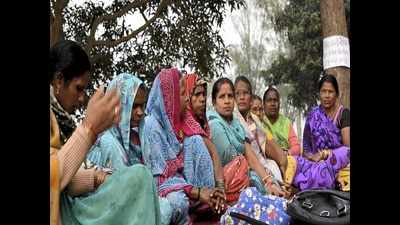- News
- City News
- lucknow News
- One lakh UP moms build an anti-dowry network
Trending
This story is from May 14, 2018
One lakh UP moms build an anti-dowry network

The Sanghs work as pressure groups against all issues that can bother women and children
LUCKNOW: Ram Janki had never thought that she would be the biggest road block in her son Arun's marriage. The pre-conditon laid by the 42-year old was not acceptable to her husband, son and even in-laws. She wanted the marriage to be solemnised in a simple ceremony and without exchange of dowry.
"Dahej hi sab fasad ki jad hai (dowry is at the root of all problems)," remarked Ram Janki of Gorakhpur's Jangal Maghi village.In Mau's Dhelabad Gaon village, parents of a bride-to-be could not believe their ears when they heard that there was no demand for dowry.

"Koi dahej nahi matlab koi dahej nahi... (no dowry means no dowry)," is what Maina Devi told her daughter-in-law's parents.
"The Sanghs work as pressure groups against all issues that can bother women and children. Gender discriminatory practices such as dowry, domestic violence, sexual violance, not sending girl child to schools are a few example. The groups also work to create awareness on these issues so that a preventive environment can be made," explained Smriti Singh, director, Mahila Samakhya.
She added that the pledge against dowry is one of the many good practices being followed by them.
"The general belief is that dowry is at the root of gender discrimination. Thus, the first step to equality is to stand up against this social evil," she stated adding that 8,200 sanghs were working in 16,636 villages of 19 districts. "Each of these sanghs comprise 15-20 women which makes them a body of over 1.2 lakh and a force to reckon with," said Smriti.
These women ensure that the custom of dowry doesn't take place at least in the wedding of their children. On several occasion, sangh women end up becoming match makers. Chandrawali Devi of Miyan Mirpur Tola village married off her son to the daughter of a sangh fellow in the neighbouring village.
The women reason stand against dowry and cite the benefits too. Some of them stated that the brides who come home in a wedding sans dowry were more willing to adjust and accommodate the traditions of the new family. "Jo le de ke ati hain, woh rishte-natey samajhti hai... (Those who come without dowry value relationships more than others)," concluded Shanti Devi of Balna village in Sravasti.
Women in the sangh not only believe and practice the right to choice, they also value the choice made. They even stand by their daughters-in-law against the percieved usual norm. In Sitapur's Kisana village for instance, Sunita Devi bashed up her son when he raised his hand over his wife. "Aurat hi aurat ka sath nahi degi toh kaun dega (if a woman will not stand by another woman, no one else would)," Sunita said.
"Dahej hi sab fasad ki jad hai (dowry is at the root of all problems)," remarked Ram Janki of Gorakhpur's Jangal Maghi village.In Mau's Dhelabad Gaon village, parents of a bride-to-be could not believe their ears when they heard that there was no demand for dowry.

"Koi dahej nahi matlab koi dahej nahi... (no dowry means no dowry)," is what Maina Devi told her daughter-in-law's parents.
Not just these two, believing that dowry was at the root of many gender discriminatory practices, a network of over a lakh women has risen against the century-old custom in 19 districts of the state. Known as sanghs, these women groups came up under the guidance of Mahila Samakhya - a body formed under the ministry of human resource development to promote women empowerment initiatives.
"The Sanghs work as pressure groups against all issues that can bother women and children. Gender discriminatory practices such as dowry, domestic violence, sexual violance, not sending girl child to schools are a few example. The groups also work to create awareness on these issues so that a preventive environment can be made," explained Smriti Singh, director, Mahila Samakhya.
She added that the pledge against dowry is one of the many good practices being followed by them.
"The general belief is that dowry is at the root of gender discrimination. Thus, the first step to equality is to stand up against this social evil," she stated adding that 8,200 sanghs were working in 16,636 villages of 19 districts. "Each of these sanghs comprise 15-20 women which makes them a body of over 1.2 lakh and a force to reckon with," said Smriti.
These women ensure that the custom of dowry doesn't take place at least in the wedding of their children. On several occasion, sangh women end up becoming match makers. Chandrawali Devi of Miyan Mirpur Tola village married off her son to the daughter of a sangh fellow in the neighbouring village.
The women reason stand against dowry and cite the benefits too. Some of them stated that the brides who come home in a wedding sans dowry were more willing to adjust and accommodate the traditions of the new family. "Jo le de ke ati hain, woh rishte-natey samajhti hai... (Those who come without dowry value relationships more than others)," concluded Shanti Devi of Balna village in Sravasti.
Women in the sangh not only believe and practice the right to choice, they also value the choice made. They even stand by their daughters-in-law against the percieved usual norm. In Sitapur's Kisana village for instance, Sunita Devi bashed up her son when he raised his hand over his wife. "Aurat hi aurat ka sath nahi degi toh kaun dega (if a woman will not stand by another woman, no one else would)," Sunita said.
End of Article
FOLLOW US ON SOCIAL MEDIA










